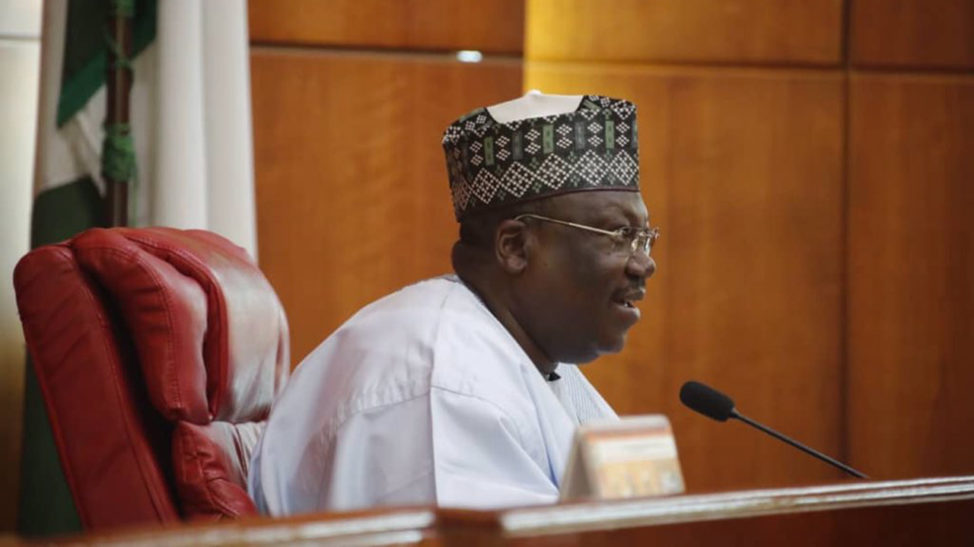By John Akubo, Abuja
Despite misgivings by some Nigerians about the performance of the Ninth National Assembly, the ninth Senate under Ahmad Lawan’s leadership made serious impact with presentation of 1, 129 bills with over 500 successfully passed.
Under his watch, the President and Commander-in-chief of the Armed Forces, former President Muhammadu Buhari assented to 131 of the bills, the highest in Nigeria’s history.
In the last few days, President Bola Ahmed Tinubu, has also assented to two Bills passed by the ninth National Assembly, namely the “Constitution of the Federal Republic of Nigeria, 1999 (Fifth Alteration) (No.37) Bill, 2023”, which extends the retirement age of high court judges, and others, from 65 to 70 years. This was the first Bill to be signed by the President since taking the oath of office. The President on June 9, 2023, also assented to the
Electricity Act 2023, which we had been passed in July 2022. The new law replaces the Electricity and Power Sector Reform Act of 2005.
Beyond the impressive numbers, however, the laws cut across the 11 priority areas of ninth Senate Legislative Agenda.
The bills also laid the foundation for multi-sectoral reforms and revitalisation of the Nigerian state.
For example, for the first time in decades, the upper legislative chamber enacted the Petroleum Industry Act to overhaul the oil and gas sector to better respond to the changing environment and foster stronger sector growth.
The ninth senate passed numerous legislations to stimulate the Nigerian economy and improve the ease of doing business that included the Banks and Other Financial Institutions Act 2020, Finance Act 2020, Companies and Allied Matters Act 2020, Deep Offshore and Inland Basin Production Sharing Contract (Amendment) Act 2019, and many others.
To enhance accountability and promote good governance, they also enacted the Proceeds of Crime (Recovery and Management) Act 2022, Money Laundering (Prevention and Prohibition) Act 2022, and Police Act 2020, among others. Critically too, they successfully enacted the Electoral Act 2022, which reformed the electoral process to enhance transparency and inspire greater voter confidence.
The National Social Investment Programme Agency Act 2023 was meant to institutionalise and provide a legal framework for government programmes targeting the poor and vulnerable.
The ninth Senate also passed 16 Constitutional Alteration Bills targeted at, among other things, providing for the Financial Independence of State Houses of Assembly and State Judiciary; decongesting the Exclusive Legislative List by moving railway to the Concurrent Legislative List; authorising States to generate, transmit and distribute electricity in areas covered by the national grid; and making it mandatory for the President and Governors to submit the names of persons nominated as ministers or commissioners within 60 days of taking the Oath of Office for confirmation by the Senate or State House of Assembly.
The ninth Assembly strengthened the budget process to reduce delays experienced in previous Assemblies and ensure speedy consideration and passage of the Appropriation law. In the past, delays in the budget process led to poor budget implementation, especially the capital component. Working with the Executive, we returned Nigeria to the January-December budget cycle for the first time in 12 years.
Additionally, measures were taken to ensure that the Appropriation Bill was prepared in line with the financial principles contained in the Finance Act. In 2023, they amended 11 legislations to reflect the, provisions of the Finance Act.
There is no gainsaying that the legislations they have passed are critical and could potentially address the multitude of economic and social challenges facing Nigerians, improve social services (health and education), stimulate job creation, reduce poverty and ensure the security of lives and properties.
However, Nigerians seemed not to be impressed by the scorecard of the ninth senate mainly due to the many contradictions as experienced in the failure of the Electoral Act to deliver a transparent electoral process in the 2023 general election. The infractions against the Electoral Act happened before and during the election by lawmakers, politicians, the electoral umpire, and even the courts were also complicit.

For instance, the Former Senate President, Ahmed Lawan who supretended over the making of the electoral Act 2022, Senator Godswill Akpabio, former Ebonyi State Governor, Dave Umahi, Bauchi State Gov, Bala Muhammed were all guilty of double nominations in the same election cycle, which the Electoral Act frowned at.
All the characters listed above contested the primary election to be nominated as candidate for presidency in their political parties, however, when they lost they quickly went back to be elected as senators, or governors as the case might be.
The return of Lawan by the Supreme Court after the Appeal Court had done justice may have become Lawan’s greatest burden.
Weighing in on the contentious issues, Femi Falana (SAN), said: “The most interesting one is that of the Senate President and Senator Akpabio. Now as the Senate President, you coordinated the promulgation of a new Electoral Act 2022. Section 115(d) of that law has criminalised double nominations. So, you can’t say that you took part in the presidential primary and also took part in the senatorial primary at the same time.
“Under that section, double nomination attracts two years imprisonment. Again, I will expect INEC to draw the attention of the APC to the provision of the law that they are playing with fire.”
Even colleague senators did not spare Lawan as the Senator who represented Imo West in the ninth Senate that just ended, Rochas Okorocha recently threw a jibe at the outgoing President of the Senate Ahmad
Lawan when he asked him to teach him how he was able to beat the electoral act and triumphed over the double nomination prohibition in same election circle.
Senator Okorocha, who spoke during the valedictory session of the 9th Senate, told Lawan that his return to the senate has opened another area of study in politics.
“You have opened another chapter of great discussion in our political history because I was there in the field with you when we all ran for Presidency.
“I never knew how you were able to meander to return and leaving some of us. Next time you must teach me how to do that.”
Lawan, who interjected, told the former Imo State governor that it was easy. “I was there with you in the field but after our defeat, my constituents thought they needed me again and so they asked for me to come back and it was a tough journey because we had to go though the Courts. I didn’t win in the appeal Court. The judgment did not favour me.
“The party and the stakeholders in my constituency appealed up to the Supreme Court. I refused. So there is nothing magical or anything to learn from what happened.
“The only thing is you were determined not to come back. I know if you had wanted to come back to the senate, you would have done that faster and earlier than I would have returned.
Not yet done, Senator Okorocha said no matter what, “I want to be your student next time because it is the more you look the less you understand.”
Lawan concluded saying, ‘he who laughs last laughs the best.’
Then came the bombshell in what could be referred to as a Freudian Slip by Senator Adamu Bulkachuwa, at the valedictory session of the 9th Senate last Saturday.
Bulkachuwa, who represented Bauchi North senatorial district, told his colleagues that many owe their stay in the green chambers to the ‘benevolence’ of his wife, a retired judicial officer. Despite the best efforts of the former Senate President Ahmad Lawan to stop him, the reputation of the Nigerian judiciary was damaged.
Senator Bulkachuwa started by drawing his colleagues’ attention to the fact that his wife, Zainab Bulkachuwa, who retired three years ago as president of the court of appeal, had been very supportive of them.
Still on the electoral act, Lawan also goofed recently when he claimed that the Electoral Act, 2022, did not provide for electronic transmission of election results.
Lawan made the claim while contributing to a motion sponsored by Senator Ibrahim Oloriegbe, representing Kwara Central Senatorial District on the platform of the All Progressives Congress (APC), on the controversies trailing the February 25 Presidential and National Assembly elections.
The President of the Senate, said that what was passed by the National Assembly was snapping of election results and transferring to the server of the Independent National Electoral Commission (INEC).
The vice presidential candidate of the Labour Party (LP), Yusuf Ahmed Baba Datti, had challenged the President of the Senate, Ahmed Lawan to stop trying to rewrite the electoral act to justify the controversy of non-transmission of polling units results in the just concluded 2023 presidential election.
Lawan, at plenary, explained that in the electoral act they passed, there was nothing like electronics transmission.
According to him, Electronics transmission is when votes are transmitted to the server. “What we have passed, I read through it when it was a bill several times, is to transfer after all the paper work that we normally do, are done.
“The agents and everybody there, including security, will have the papers. INEC will snap or scan the result sheet and transfer, and that is what is captured with BVAS as the results.”
Speaking to newsmen in Abuja on Wednesday against the backdrop that the senate President had tried to clear the air on electronics transmission of results at plenary, Datti said, “This gentleman, as far as we are concerned, contested Presidency and now he is an elected senator returned by the Supreme Court, yet the electoral act says you can not contest two offices in the same election circle.
“It is on record he contested for the presidency. Supreme Court now says he is senatorial candidate and then he sits as Senate President to give us this kind of opinion.
“Paragraph 38 of INEC Manual 2022 made pursuant to the provisions of the constitution of the Federal Republic of Nigeria 1999 as amended and section 149 of the Electoral Act 2022 provides that: On completion of all the Polling Unit voting and results procedures, the Presiding Officer shall:
“Electronically transmit or transfer the result of the Polling Unit, direct to the collation system as prescribed by the Commission. Use the BVAS to upload a scanned copy of the EC8A to the INEC Result Viewing Portal (IReV), as prescribed by the Commission.
“Take the BVAS and the original copy of each of the forms in tamper evident envelope to the Registration Area/Ward Collation Officer, in the company of Security Agents. The Polling Agents may accompany the Presiding Officer to the RA/Ward Collation Centre.
“The word used in paragraph 38 of the manual made pursuant to the Electoral Act 2022 is shall. It is mandatory and compulsory. INEC has no option.”
Nigerians also were not happy with the perchance of the 9th Senate for giving approvals to almost all loan request without properly scrutinising the implication which has led the country to a whooping.”
Nigeria’s 1999 constitution gave lawmakers the power of the purse to moderate the excesses of the executive by putting stipulations on the use of funds.
The country’s worsening poverty amidst profligate spending funded by debts, even as crude oil, the nation’s major revenue earner, declines, shows the folly of the lawmakers in abdicating their responsibility to Nigerians.
Since 2015, the budget deficit has averaged N4 trillion every year. In 2022, Nigeria’s debt service-to-revenue ratio stood at 80.6 percent.
The International Monetary Fund (IMF) had also predicted the federal government will spend 82 percent of its revenue on interest payments in 2023, the most of any country, of which the projections hold true, analysts say.
Culled from The Guardian



